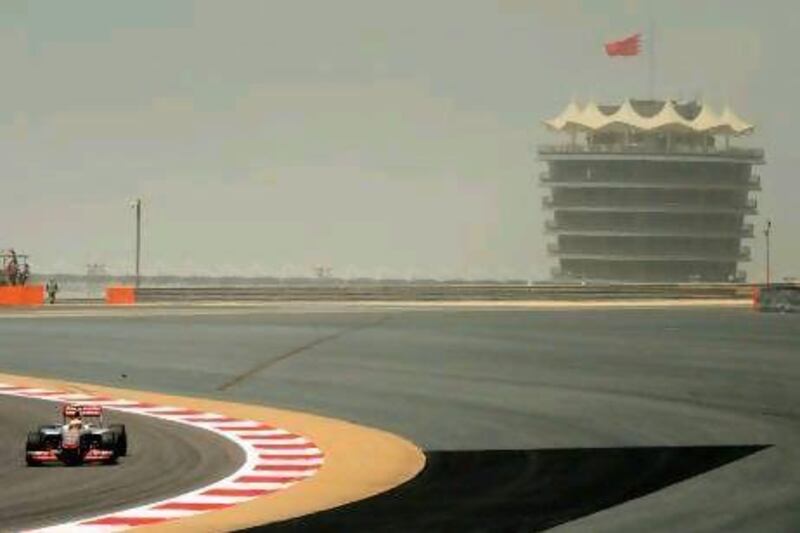SAKHIR // Anxiety is commonplace in a sport where incalculable risks are taken on a daily basis, yet never before has a Formula One race been anticipated in quite this manner.
Ever since the Gulf kingdom reappeared on the 20-race calendar after being cancelled twice last year following civil unrest, the beleaguered event has been clouded by safety concerns and security issues.
The Federation Internationale de l'Automobile (FIA), world motorsports' governing body, only last week was forced to assure F1 personnel the country was safe.
The various teams, trickling in from Monday onwards, have expressed calmness and consternation in near equal measure.
Sergio Perez, the Sauber driver, arrived as early as possible and spent the start of the week at the beach with a friend who lives here.
Caterham's Vitaly Petrov went waterskiing. A staff member for one marque said he has seen less trouble this year than he did in 2010, the last time Formula One raced here.
Yet the danger is real and, as Force India discovered on Wednesday night when their car came precariously close to a firebomb, it can find you even when you do not go looking for it.
Two Force India staff members have flown home early, while Sauber too, victim of a Thursday evening scare when their bus found itself the focus of masked men, can attest to frayed nerves.
Manama provides a temporary base this week for many of those involved with the travelling circus and, despite Associated Press reports of a Shiite demonstration on Friday attended by "tens of thousands" of people protesting against Sunni rule, the city has largely provided the picture of normality spoken of by Bahraini officials.
Restaurants have been busy with young Bahrainis, dressed in smart shirts and floral dresses, chatting and slurping soft drinks.
Twenty kilometres south-west of the capital lies the dusty desert region of Sakhir, home of the Bahrain International Circuit. It is here, in the nearby international chain hotels, where the majority of F1 drivers are residing this weekend, as close to the track as possible.
It is accessible from Manama only by travelling one of two parallel and unremarkable 20km stretches of asphalt, both of which scythe through majority-Shiite villages, some of which have been encircled in barbed wire in an attempt to contain potential protesters.
Some reporters traversing the Sheikh Khalifa bin Salman Highway have counted up to 88 police vehicles, riot vans and armoured cars. Other correspondents have witnessed relatively little presence on the adjacent Sheikh Salman Highway.
The headquarters of Al Wefaq, the main opposition party to the Al Khalifa ruling family, on Friday morning had removed a large poster of Abdulhadi Al Khawaja, the prominent activist and imprisoned hunger striker. Three police jeeps were parked nearby.
On arrival at the circuit, police reportedly check spectators faces against photographs of known activists, while some media have had water bottles and pens confiscated by circuit security. Other journalists have experienced no bag checks.
Once inside the paddock, with its palm trees, Bedouin tents and lush green gardens, it is excusable to forget the issues playing out a few kilometres away.
On Friday evening, Ferrari's Fernando Alonso tweeted a photo with the note: "The paddock in Bahrain is one of the most beautiful in the world, right?" On the nearby Zallaq Highway an organised rally was continuing.
The increased amount of sponsorship investment coming from the Middle East has been the focus of much interest as questions continue regarding whether the FIA was right to give the race the green light. Mumtalakat, the Bahraini government's investment arm, owns 42 per cent of the McLaren Group and 50 per cent of its automotive wing.
The kingdom's crown prince has been a regular sight around the paddock, yesterday posing for photos with race volunteers outside of Red Bull Racing's hospitality building before heading next door for an informal chat with Martin Whitmarsh, the McLaren-Mercedes team principal.
Typically, when a grand prix rolls into town, company executives from team sponsors look to reap the benefits and secure guest passes. This weekend, however, Royal Dutch Shell, who sponsor Ferrari, are not hosting any guests. A Lotus insider said the team is hosting nobody after the five proposed guests pulled out. On an average race weekend, the marque host between 50 and 70 guests.
It is not only the hospitality buildings that are quieter. Friday's practice sessions were poorly attended, but on the traditional day of prayer, that was not wholly unexpected. Yesterday's qualifying attracted marginally more. Sheikh Salman bin Hamad Al Khalifa, the circuit chief executive, said all 34 corporate boxes have been bought for today's race and it is understood the grandstand has also sold out.
Such an attendance will mean more bodies travelling through the gates at Bahrain International Circuit today than at any other stage of the week. As the world waits to witness today's happenings, increased security is inevitable, yet for everybody involved, the hope is it proves ultimately unnecessary.
Follow us
[ @SprtNationalUAE ]
& Gary Meenaghan
[ @GMeenaghan ]





